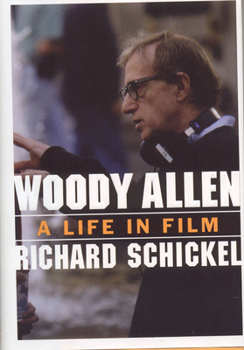Woody Allen: A Life in Film
Select Format
Select Condition 
Book Overview
In an unprecedented television program last year, Woody Allen spoke to the camera for the first time about the entire range of his work, in an interview with Richard Schickel, the distinguished film critic and historian. Mr. Allen talked about how he does it, why he does it, its roots in his early life, and his current thinking about the state of his art. The result Woody Allen: A Life in Film, was one of the most popular and critically acclaimed programs in the history of Turner Classic Movies. But the presentation contained only a small fraction of Mr. Schickel's four-hour interview with the famed writer-director-actor. This new book reprints the complete conversation between the two men and includes a long essay of introduction by Mr. Schickel, which places Woody Allen's entire career in critical perspective. Readers will find Mr. Allen's reflections on his major preoccupations--the battle of the sexes; the conflict between reality and fantasy in his major films; mortality, religion, and the role that chance plays in the unfolding of our lives. The book also offers insights into Mr. Allen's working methods as a writer and the growth of his skills as a director, as well as his assessment of himself as an actor and his surprising views of his long life in the public eye. Brief but sharply honed, Woody Allen: A Life in Film is an essential book for anyone seeking to understand the life and times of one of the most important and least understood American filmmakers of our era.
Format:Hardcover
Language:English
ISBN:1566635284
ISBN13:9781566635288
Release Date:July 2003
Publisher:Ivan R. Dee Publisher
Length:224 Pages
Weight:0.95 lbs.
Dimensions:0.9" x 6.0" x 8.5"
Customer Reviews
2 ratings
A Great Filmmaker's View of Himself
Published by Thriftbooks.com User , 21 years ago
Woody Allen makes films like no one else. Sure, the themes of Allen's films (New York, anguished intellectuals) aren't ones that are shared by most blockbusters, but his process of making films is different. Since he started making his own films over thirty years ago, he has put out about one every year, a record no other American director has come close to, and of course he writes them and acts in most of them. It is no metaphor that he has put his life into films, and in _Woody Allen: A Life In Film_ (Ivan R. Dee), the movie critic for _Time_ magazine, Richard Schickel, examines the life work along with Allen. The book is the complete text of a four-hour interview shown last year on the invaluable Turner Classic Movies channel; that version was edited to ninety minutes. It also has an essay of appreciation about Allen's work, which Schickel clearly values. He admits that he is biased, not because of friendship for Allen, but because of similarities between them, being roughly the same age and distrusting organized religion, corporate America, and aromatherapy. Allen "... speaks to me - and _for_ me sometimes - in a quite uncomplicated way." If you do not share his bias, he warns, you are reading the wrong book. If you do, you will find Schickel's essay, and especially Allen's own words about his work, a delight.The film a year output has lead to many people thinking that along with all the other neuroses that Allen has depicted for himself, he is a workaholic. He denies it. He likes the work. "It keeps me sane to the degree that I'm sane. It helps me." But if he can't get the shot exactly right, and it is time for the Knicks game, he lets the shot go. He may love making the movies, but he is distinctly modest about them. "I think I'm going to write _Citizen Kane_ every time out of the box, and it's going to be great." And then he is humiliated by what he sees on the screen. "I have failed almost every time..." He reflects here on his ability to make jokes; even in high school, he could get out of class at one and go into New York to start writing jokes for clients to put in the newspapers. His films are not all just funny, of course. Even though there is humor in, say, the masterful _Crimes and Misdemeanors_, the sad lesson of the movie is that good intentions don't count; "... they do in your heart - but to society success is the bottom line." The earnest film-maker in the movie is a loser and the murderous doctor loses nothing. "I just wanted to illustrate in an entertaining way that there's no God, that we're alone in the universe..." No wonder people like his early funny ones.Schickel has done a masterful job asking the right questions. He does not go much into Allen's personal life, but sticks to the work. Allen gets to explain his attitude toward actors, and it is clear why he can continue to get the best of them to work with him. He lets them improvise, and he lets them alone: "You get out of the way and let th
More interview, less essay!
Published by Thriftbooks.com User , 21 years ago
The prefatory essay is about 65 pages long, and the entire book, stopping short of the filmography and index, is about 174 pages. Because the book is so slim, I felt a bit cheated once I finally got to the interview. Maybe the publisher wanted an extended essay to make the book long enough to be marketable, but just beware -- interesting essay, fascinating interview (if you like Allen), but when you see how slim the book is, just realize less than 2/3rds of it is interview.






